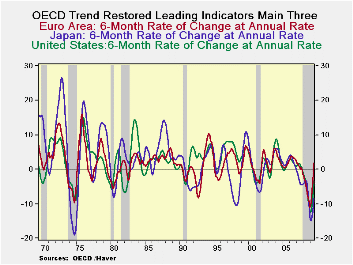 Global| Oct 09 2009
Global| Oct 09 2009OECD Sounds the All-Clear - Almost
Summary
OECD gets upbeat - The OECD is getting much more upbeat in its assessment of the world's leading economies. It now contends that they may now be recovering or growing after hitting the bottom of their respective economic recessions in [...]

OECD gets upbeat - The OECD is getting much
more upbeat in its assessment of the world's leading economies. It now
contends that they may now be recovering or growing after hitting the
bottom of their respective economic recessions in 2009. Recovery is at
hand, according to leading indicators released Friday by the
Organization for Economic Cooperation and Development that is the
newest development.
Good and somewhat surprising news - The OECD
trend-restored leading indicators continue to point to a recovery for
most developed economies. France and Italy - that have both posted
three or more months of an index level above the key 100 mark - are
now, in the OECD lexicon, experiencing "potential expansion." The
Composite Leading Indicator for the OECD's 30 members rose for the
sixth straight month in August to reach 99.2 from 97.7 in July that is
very close to the 100 line that it must cross to be truly on the road
to an optimistic result. "OECD composite leading indicators for August
2009 continue to point to a recovery in all major economies with CLIs
for France and Italy pointing to expansion," the OECD said.
Who’d a’ thunk it? Italy and France lead
- For now that is certainly a breath of fresh air. Various national
sources have been showing the same sorts of results. The surprise is
that Italy joins France as one of the recovery leaders. Italy’s
consumer confidence measures have been moving up briskly but Italy is
still having some difficulties and business confidence has recently
slipped. In contest France continues to pump out good figures as public
spending there has been effective in stopping the bleeding and turning
things around.
...and the US is - Over 12-months the US is still
seeing its OECD CLI drop but over three-months the US index is rising
nearly as fast as the indicators for the e-Zone. Over six months the US
is still doing well but it is several steps behind the e-Zone reading
and others. The six month horizon is the assessment favored by the OECD.
A good report card for the global economy - For now
it’s a good report card on a global economy that is making progress.
The rise up from this recession’s relatively deep pit is at a strongly
sloped gradient compared to past cycles. Despite all the pessimism
about growth and growth prospects the OECD’s CLI’s look very upbeat
indeed.
| OECD Trend-restored leading Indicators | ||||
|---|---|---|---|---|
| Growth progression SAAR | ||||
| 3-Mos | 6-Mos | 12-Mos | Yr-Ago | |
| OECD | 17.4% | 12.9% | -1.3% | -5.2% |
| OECD 7 | 18.7% | 13.2% | -2.5% | -5.7% |
| OECD Euro Area | 19.7% | 16.2% | 1.8% | -6.6% |
| OECD Japan | 12.5% | 6.8% | -8.4% | -4.1% |
| OECD US | 19.3% | 12.8% | -3.5% | -5.4% |
| Six month readings at 6-Mo Intervals: | ||||
| Recent six | 6-Mos Ago | 12-Mos Ago | 18-Mos Ago | |
| OECD | 12.9% | -13.8% | -8.3% | -2.1% |
| OECD 7 | 13.2% | -15.9% | -8.4% | -3.0% |
| OECD Euro Area | 16.2% | -10.8% | -10.5% | -2.5% |
| OECD Japan | 6.8% | -21.5% | -7.1% | -0.9% |
| OECD US | 12.8% | -17.4% | -7.2% | -3.6% |
| Slowdowns indicated by BOLD RED | ||||
Robert Brusca
AuthorMore in Author Profile »Robert A. Brusca is Chief Economist of Fact and Opinion Economics, a consulting firm he founded in Manhattan. He has been an economist on Wall Street for over 25 years. He has visited central banking and large institutional clients in over 30 countries in his career as an economist. Mr. Brusca was a Divisional Research Chief at the Federal Reserve Bank of NY (Chief of the International Financial markets Division), a Fed Watcher at Irving Trust and Chief Economist at Nikko Securities International. He is widely quoted and appears in various media. Mr. Brusca holds an MA and Ph.D. in economics from Michigan State University and a BA in Economics from the University of Michigan. His research pursues his strong interests in non aligned policy economics as well as international economics. FAO Economics’ research targets investors to assist them in making better investment decisions in stocks, bonds and in a variety of international assets. The company does not manage money and has no conflicts in giving economic advice.
More Economy in Brief
 Global| Feb 05 2026
Global| Feb 05 2026Charts of the Week: Balanced Policy, Resilient Data and AI Narratives
by:Andrew Cates






